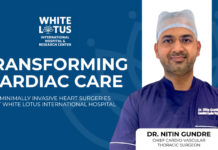-
Published in the journal – Blood Advances – the studies aim to study the efficacy of cord blood in treatment of diverse disorders
-
Studies’ outcome crucial for multi-ethnic country like India, where the chances of finding a matching donor are very low.
New Delhi: American Society of Hematology (ASH), the world’s largest professional society working to conquer blood diseases has recently released two key studies on cord blood transplants, as part of its Blood Advances journal. Led by a team of leading researchers from University of Colorado and University of Pittsburgh, the two studies have brought to foray the various benefits of cord blood transplant over bone marrow in cancerous and non-cancerous disorders. With the growing concerns among medical fraternity about finding matching bone marrow donors in a multi-ethnic country like India, the findings of the studies clearly outline the efficacy of cord blood in the treatment of diverse disorders.
In the study conducted to weigh benefits of cord blood transplant over bone marrow transplant for cancerous disorders, University of Colorado researchers compared the outcomes of matched bone marrow and double-unit cord blood transplants in adults. Amongst the 313 patients studied (190 cord blood transplant and 123 matched related donor transplant patients), the two key findings emerged. One, Chances of developing graft versus host disease were higher with bone marrow as compared to cord blood transplants and two, it was discovered that relapse rates were lower in patients who received a cord blood transplant.
Followed by the findings of the first study, a second study on the efficacy of cord blood transplant among non-cancerous disorders was also undertaken by a team of researchers from University of Pittsburgh. The researchers successfully treated 44 children suffering from various non-cancerous & immune disorders with a combination of low dose chemotherapy and single-unit of HLA-mismatched cord blood with no cell expansion. The successful outcomes provided by this first of its kind and the largest trial showed that cord blood outperformed bone marrow in terms of graft failure, treatment related mortality and event-free survival. Also, this gives tremendous confidence to patients & doctors in a multi-ethnic country like India where the chances of finding a matching donor are very low.
Commenting on this, Dr. Sunil Bhat, MBBS, MD (Pediatrics) Mazumdar Shaw Cancer Centre, Narayana Health City, Bengaluru said, “Authors have tried a new conditioning regimen which is “reduced toxicity” hence less toxic to the patients but at the same time quite effective resulting into good outcomes in these difficult disease conditions. The application of “immune boost” post-transplant is also novel and results into better immune recovery and less complications especially of infections post cord blood transplant.”
“Another study which was published during same year gives a clear understanding on how to select a cord blood donor based on Human Leukocyte Antigens (HLA) match and also makes clear recommendations on the stem cell dose required for successful transplant. This study is also a great guide to the physicians to select cord blood donors for transplant purpose.
Other key highlights from the studies:
Study 1 – To understand the efficacy of Cord Blood transplants over bone marrow for Cancerous disorders
- Outcomes of this study demonstrated that cancer patients undergoing cord blood transplants showed better improvement & developed lesser complications than those who received matched sibling donor transplants.
- The overall improved recovery rate and lack of complications resulted in low costs associated with post-transplant care.
- This treatment protocol had a distinct positive impact on the patients’ quality of life.
Study 2 – To understand the efficacy of Cord Blood transplants over bone marrow for non-cancerous disorders
- The graft failure rate of <5% seen in this trial is the lowest ever reported for non-manipulated cord blood grafts in non-cancerous or even in cancerous diseases.
- The lowest 1-year (Treatment-Related Mortality) TRM of 5%, resulting in >90% Event Free Survival (EFS) at 1 year was reported.
- A single unit of allogeneic cord blood could be identified for each of the 44 eligible children regardless of their ethnicities, showing the unique and unparalleled suitability of cord blood grafts even without being perfectly (HLA) matched.
- No cell expansion was required in the trial. In general, a single cord blood unit doesn’t have sufficient stem cells to treat adults.
- No patient developed severe chronic graft versus host disease and a distinct improvement in the quality of life was reported.
- The novel treatment protocol used in the trial prevented graft failure and aided immune reconstitution.










